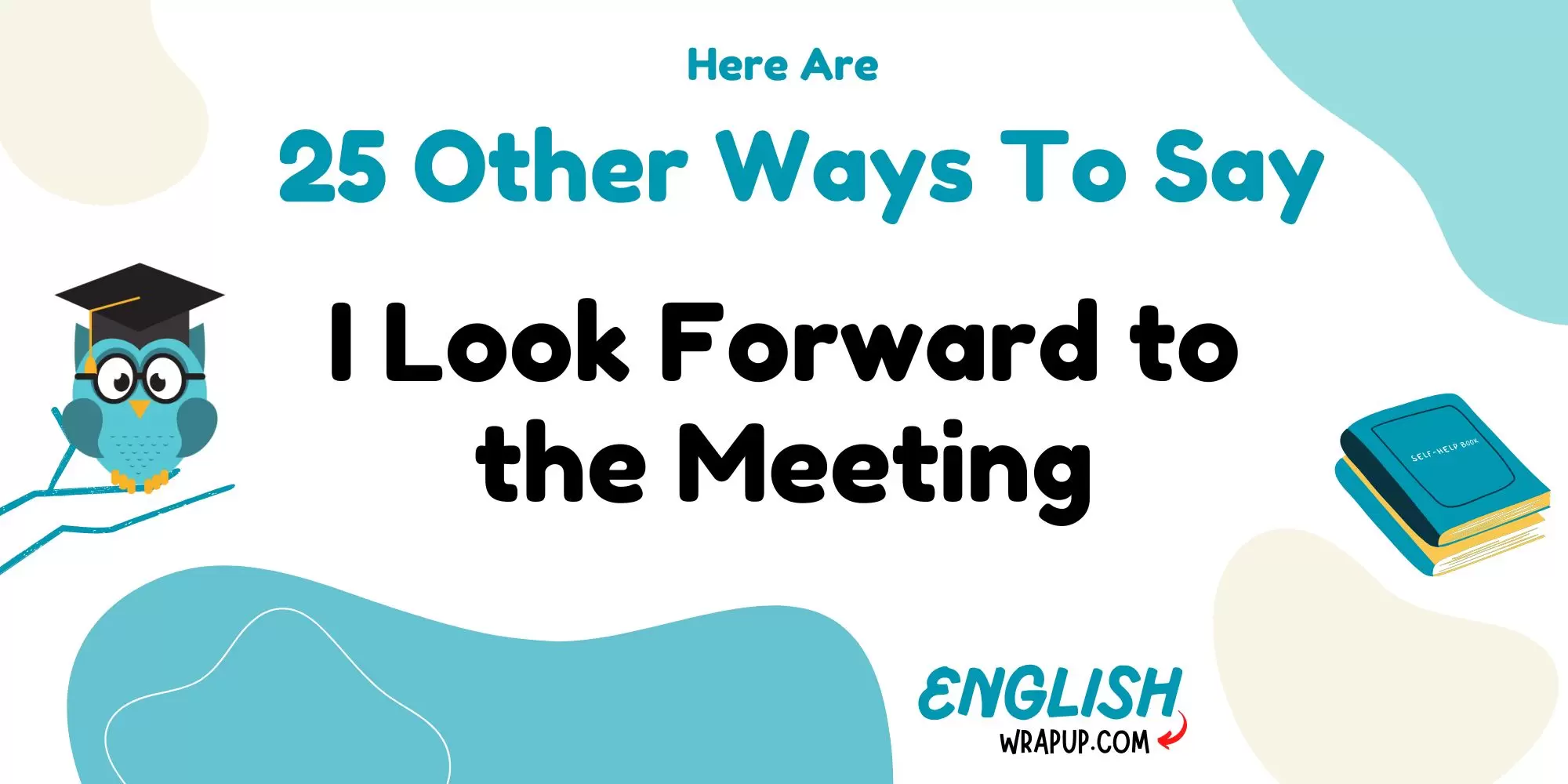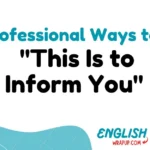Welcome to the world of idioms, where language dances with color and expression! Idioms are phrases or expressions that convey meanings beyond their literal interpretation, often adding depth and richness to our communication.
In this article, we’ll delve into 25 alternative ways to express anticipation for a meeting, offering a diverse range of expressions to suit various tones and situations.
Is It Professional to Say “I Look Forward to the Meeting”?
Yes, “I look forward to the meeting” is a professional and polite way to express anticipation for an upcoming meeting. It conveys a positive attitude and eagerness to engage in productive discussions or collaborations. This phrase is commonly used in business communications,
such as emails or verbal exchanges, to convey readiness and enthusiasm for the scheduled meeting. It helps foster a positive atmosphere and sets a cooperative tone for the upcoming interaction.
What To Say Instead Of “See You Then”?
- I’m eager for our meeting.
- I anticipate our meeting.
- I’m excited about the upcoming meeting.
- I’m looking forward to our scheduled meeting.
- I can’t wait for our meeting.
- I eagerly await our meeting.
- Our meeting is something I’m really looking forward to.
- I’m keen to meet with you.
- I’m eagerly anticipating our meeting.
- I’m enthusiastic about our upcoming meeting.
- Our meeting is something I’m really excited about.
- I’m eagerly awaiting our meeting.
- I’m eagerly anticipating our upcoming discussion.
- I’m really looking forward to our meeting.
- I’m excited to discuss matters during our meeting.
- Our meeting is something I’m eagerly looking forward to.
- I’m eagerly anticipating our upcoming conversation.
- I’m really excited about our upcoming meeting.
- I’m eagerly awaiting our scheduled meeting.
- I’m enthusiastic about our forthcoming meeting.
- I’m eager to engage in our meeting.
- I’m eagerly anticipating our scheduled meeting.
- I’m eagerly awaiting our conversation during the meeting.
- I’m eagerly looking forward to our meeting.
- I’m enthusiastic about the opportunity to meet with you.
Until then.
“Until then” is a concise and informal way to express anticipation for an upcoming meeting. It implies a sense of readiness and excitement for the future encounter, suggesting that the speaker is looking forward to reconvening at the appointed time.
Example:
“Until then,” said Sarah, smiling warmly as she left the conference room, eager to reconvene for their next meeting.

I’m eager for our meeting.
“I’m eager for our meeting” communicates a strong sense of enthusiasm and anticipation for the upcoming gathering. It conveys eagerness and readiness to engage in discussions or activities during the meeting.
Example:
“I’m eager for our meeting,” declared Tom, as he prepared his notes and agenda for the discussion.
I anticipate our meeting.
“I anticipate our meeting” expresses a sense of expectation and anticipation for the forthcoming gathering. It suggests that the speaker is eagerly looking forward to the opportunity to meet and interact with others.
Example:
“I anticipate our meeting,” remarked Emily, checking her calendar to ensure she was well-prepared for the discussion.
I’m excited about the upcoming meeting.
“I’m excited about the upcoming meeting” conveys genuine enthusiasm and anticipation for the scheduled gathering. It indicates that the speaker is looking forward to the opportunity to participate and contribute to the meeting.
Example: “I’m excited about the upcoming meeting,” exclaimed Alex, eager to share his ideas and insights with the team.
I’m looking forward to our scheduled meeting.
“I’m looking forward to our scheduled meeting” is a formal and polite way to express anticipation for an upcoming gathering. It conveys a sense of readiness and eagerness to engage in productive discussions or activities during the meeting.
Example:
“I’m looking forward to our scheduled meeting,” stated Lisa, as she finalized the agenda and logistics for the upcoming discussion.
I can’t wait for our meeting.
“I can’t wait for our meeting” expresses impatience and excitement for the upcoming gathering. It conveys a sense of eagerness and anticipation, indicating that the speaker is eagerly counting down the moments until the meeting takes place.
Example: “I can’t wait for our meeting,” said Mark, eagerly checking the clock and eagerly anticipating the start of the discussion.
I eagerly await our meeting.
“I eagerly await our meeting” communicates a strong sense of anticipation and excitement for the upcoming gathering. It conveys eagerness and readiness to participate in discussions or activities during the meeting.
Example:
“I eagerly await our meeting,” declared Rachel, eagerly preparing her presentation and looking forward to sharing her ideas with the team.
Our meeting is something I’m really looking forward to.
“Our meeting is something I’m really looking forward to” expresses genuine excitement and anticipation for the upcoming gathering. It conveys enthusiasm and eagerness to engage in discussions or activities during the meeting.
Example:
“Our meeting is something I’m really looking forward to,” remarked John, smiling eagerly as he reviewed the agenda and topics for discussion.
I’m keen to meet with you.
“I’m keen to meet with you” conveys enthusiasm and eagerness to engage in a meeting or discussion with someone. It suggests a genuine interest and excitement about the opportunity to connect and collaborate.
Example: “I’m keen to meet with you,” stated Laura, eagerly awaiting the chance to discuss the project in more detail.
I’m eagerly anticipating our meeting.
“I’m eagerly anticipating our meeting” expresses strong excitement and anticipation for the upcoming gathering. It conveys a sense of eagerness and readiness to participate in discussions or activities during the meeting.
Example: “I’m eagerly anticipating our meeting,” said James, eagerly preparing his presentation and looking forward to sharing his ideas with the team.
What Are The Collective Nouns for “Alligators”
I’m enthusiastic about our upcoming meeting.
“I’m enthusiastic about our upcoming meeting” communicates genuine excitement and enthusiasm for the scheduled gathering. It conveys eagerness and readiness to engage in productive discussions or activities during the meeting.
Example:
“I’m enthusiastic about our upcoming meeting,” exclaimed Sarah, eagerly preparing her notes and looking forward to brainstorming with the team.
Our meeting is something I’m really excited about.
“Our meeting is something I’m really excited about” expresses genuine excitement and anticipation for the upcoming gathering. It conveys enthusiasm and eagerness to engage in discussions or activities during the meeting.
Example:
“Our meeting is something I’m really excited about,” remarked David, eagerly anticipating the opportunity to collaborate and share ideas with the team.
I’m eagerly awaiting our meeting.
“I’m eagerly awaiting our meeting” conveys strong excitement and anticipation for the upcoming gathering. It indicates a sense of readiness and eagerness to engage in discussions or activities during the meeting.
Example:
“I’m eagerly awaiting our meeting,” said Emily, eagerly checking her calendar and counting down the days until the discussion.
I’m eagerly anticipating our upcoming discussion.
“I’m eagerly anticipating our upcoming discussion” expresses strong excitement and anticipation for the forthcoming meeting. It conveys eagerness and readiness to engage in meaningful discussions or exchanges during the meeting.
Example: “I’m eagerly anticipating our upcoming discussion,” remarked Michael, eagerly preparing his talking points and looking forward to sharing his insights with the team.
I’m really looking forward to our meeting.
“I’m really looking forward to our meeting” conveys genuine excitement and anticipation for the upcoming gathering. It indicates eagerness and readiness to engage in discussions or activities during the meeting.
Example: “I’m really looking forward to our meeting,” said Emma, eagerly reviewing the agenda and topics for discussion.

I’m excited to discuss matters during our meeting.
“I’m excited to discuss matters during our meeting” communicates genuine excitement and anticipation for the scheduled gathering. It conveys eagerness and readiness to engage in meaningful discussions or exchanges during the meeting.
Example:
“I’m excited to discuss matters during our meeting,” exclaimed John, eagerly preparing his notes and looking forward to sharing his perspectives with the team.
Our meeting is something I’m eagerly looking forward to.
“Our meeting is something I’m eagerly looking forward to” expresses strong excitement and anticipation for the upcoming gathering. It conveys eagerness and readiness to engage in discussions or activities during the meeting.
Example:
“Our meeting is something I’m eagerly looking forward to,” said Sarah, eagerly checking her calendar and counting down the days until the discussion.
I’m eagerly anticipating our upcoming conversation.
“I’m eagerly anticipating our upcoming conversation” expresses strong excitement and anticipation for the forthcoming meeting. It conveys eagerness and readiness to engage in meaningful discussions or exchanges during the meeting.
Example: “I’m eagerly anticipating our upcoming conversation,” *remarked David , eagerly reviewing his notes and looking forward to exchanging ideas with the team.*
I’m really excited about our upcoming meeting.
“I’m really excited about our upcoming meeting” conveys genuine excitement and anticipation for the scheduled gathering. It indicates eagerness and readiness to engage in discussions or activities during the meeting.
Example: “I’m really excited about our upcoming meeting,” exclaimed Rachel, eagerly preparing her presentation and looking forward to collaborating with the team.
I’m eagerly awaiting our scheduled meeting.
“I’m eagerly awaiting our scheduled meeting” expresses strong excitement and anticipation for the upcoming gathering. It conveys eagerness and readiness to engage in discussions or activities during the meeting.
Example:
“I’m eagerly awaiting our scheduled meeting,” stated Alex, eagerly marking the date on his calendar and preparing for the discussion.
I’m enthusiastic about our forthcoming meeting.
“I’m enthusiastic about our forthcoming meeting” communicates genuine excitement and anticipation for the scheduled gathering. It conveys eagerness and readiness to engage in productive discussions or activities during the meeting.
Example: “I’m enthusiastic about our forthcoming meeting,” remarked Lisa, eagerly brainstorming ideas and looking forward to collaborating with her colleagues.
I’m eager to engage in our meeting.
“I’m eager to engage in our meeting” expresses a strong desire and readiness to actively participate in the forthcoming gathering. It conveys enthusiasm and eagerness to contribute to discussions or activities during the meeting.
Example:
“I’m eager to engage in our meeting,” said Tom, eagerly preparing his talking points and looking forward to sharing his perspectives with the team.
I’m eagerly anticipating our scheduled meeting.
“I’m eagerly anticipating our scheduled meeting” expresses strong excitement and anticipation for the upcoming gathering. It conveys eagerness and readiness to engage in discussions or activities during the meeting.
Example: I’m eagerly anticipating our scheduled meeting,” stated Emily, eagerly preparing her materials and looking forward to collaborating with her colleagues.
I’m eagerly awaiting our conversation during the meeting.
“I’m eagerly awaiting our conversation during the meeting” conveys strong excitement and anticipation for the forthcoming gathering. It indicates eagerness and readiness to engage in meaningful discussions or exchanges during the meeting.
Example: “I’m eagerly awaiting our conversation during the meeting,” remarked Michael, eagerly preparing his notes and looking forward to sharing his insights with the team.
I’m eagerly looking forward to our meeting.
“I’m eagerly looking forward to our meeting” expresses strong excitement and anticipation for the upcoming gathering. It conveys eagerness and readiness to engage in discussions or activities during the meeting.
Example: “I’m eagerly looking forward to our meeting,” said Emma, eagerly reviewing the agenda and topics for discussion.
I’m enthusiastic about the opportunity to meet with you.
“I’m enthusiastic about the opportunity to meet with you” communicates genuine excitement and anticipation for the scheduled gathering. It conveys eagerness and readiness to engage in discussions or activities during the meeting.
Example:
“I’m enthusiastic about the opportunity to meet with you,” exclaimed John, eagerly preparing his materials and looking forward to collaborating on the project.
Final Thoughts:
Idioms play a vital role in our everyday communication, allowing us to express emotions, intentions, and attitudes with flair and finesse. By incorporating idiomatic expressions into our language, we can add depth and color to our conversations, making them more engaging and memorable.
So, the next time you’re anticipating a meeting or any other event, consider using these idiomatic expressions to convey your excitement and enthusiasm effectively!

I’m Noah Wilson, the test-prep pro at “English WRAP Up.” I’ve been helping students navigate the challenges of TOEFL, IELTS, BULATS, FCE, CAE, and PTEG, making the learning process a whole lot of fun. Over at English WRAP Up, we’re here to make your test prep incredible. Let’s wrap up your English exams with confidence and skill together!



